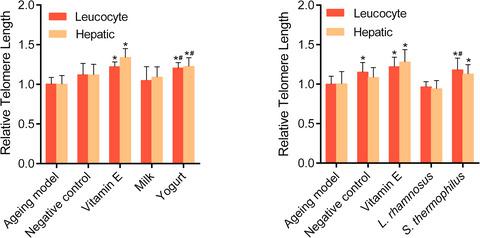当前位置:
X-MOL 学术
›
Int. J. Food Sci. Tech.
›
论文详情
Our official English website, www.x-mol.net, welcomes your
feedback! (Note: you will need to create a separate account there.)
Yogurt and Streptococcus thermophilus metabolites ameliorated telomere attrition in D‐galactose‐induced ageing mice and t‐BHP‐challenged HepG2 cells
International Journal of Food Science & Technology ( IF 2.6 ) Pub Date : 2020-01-19 , DOI: 10.1111/ijfs.14502 Shufang Shan 1 , Tianli Zheng 1 , Chaoxiong Zhang 1 , Xuejiao Song 1 , Jiayi Chen 1 , Ying Shi 1 , Jia You 1 , Guo Cheng 1 , Jingyuan Xiong 1
International Journal of Food Science & Technology ( IF 2.6 ) Pub Date : 2020-01-19 , DOI: 10.1111/ijfs.14502 Shufang Shan 1 , Tianli Zheng 1 , Chaoxiong Zhang 1 , Xuejiao Song 1 , Jiayi Chen 1 , Ying Shi 1 , Jia You 1 , Guo Cheng 1 , Jingyuan Xiong 1
Affiliation

|
Antioxidant‐rich diets affect telomere length, an integrative marker associated with age‐related diseases. Yogurt exerts antioxidative capacity and is speculated to support healthy ageing. However, direct experimental evidence is missing. Here, the effects of yogurt and dairy‐fermenting bacteria on D‐galactose‐induced ageing mice and chemically challenged HepG2 cells were evaluated. Relative telomere length (RTL) in leucocyte and liver were significantly longer in yogurt (1.21 ± 0.07; 1.23 ± 0.11) and Streptococcus thermophilus group (1.18 ± 0.15; 1.13 ± 0.12). When t‐BHP‐challenged HepG2 cells were treated with digested yogurt and S. thermophilus, the senescence index (13.67 ± 3.30; 19.67 ± 2.87) were lower and RTL (1.25 ± 0.11; 1.18 ± 0.10) were longer than the model. Antioxidative effects were observed for yogurt and S. thermophilus metabolites, whereas milk and Lactobacillus rhamnosus metabolites showed minimal influence on RTL and oxidative stress. In conclusion, this study showed that yogurt and S. thermophilus metabolites ameliorated telomere attrition in ageing mice and t‐BHP‐challenged HepG2 cells, possibly by reducing oxidative stress.
中文翻译:

酸奶和嗜热链球菌代谢物改善了D-半乳糖诱导的衰老小鼠和t-BHP挑战的HepG2细胞的端粒磨损
富含抗氧化剂的饮食会影响端粒长度,端粒长度是与年龄相关疾病相关的综合标记。酸奶具有抗氧化能力,被认为可以支持健康的衰老。但是,缺少直接的实验证据。在此,评估了酸奶和乳制品发酵细菌对D-半乳糖诱导的衰老小鼠和化学攻击的HepG2细胞的影响。酸奶(1.21±0.07; 1.23±0.11)和嗜热链球菌组(1.18±0.15; 1.13±0.12)在白细胞和肝脏中的相对端粒长度(RTL)明显更长。当t -BHP挑战的HepG2细胞用消化的酸奶和嗜热链球菌处理时,其衰老指数(13.67±3.30; 19.67±2.87)较低,而RTL(1.25±0.11; 1.18±0.10)则比模型长。观察到酸奶和嗜热链球菌代谢产物的抗氧化作用,而牛奶和鼠李糖乳杆菌代谢产物对RTL和氧化应激的影响最小。总之,这项研究表明,酸奶和嗜热链球菌代谢产物可以减轻氧化应激,从而改善衰老小鼠和t ‐ BHP挑战的HepG2细胞的端粒磨损。
更新日期:2020-01-19
中文翻译:

酸奶和嗜热链球菌代谢物改善了D-半乳糖诱导的衰老小鼠和t-BHP挑战的HepG2细胞的端粒磨损
富含抗氧化剂的饮食会影响端粒长度,端粒长度是与年龄相关疾病相关的综合标记。酸奶具有抗氧化能力,被认为可以支持健康的衰老。但是,缺少直接的实验证据。在此,评估了酸奶和乳制品发酵细菌对D-半乳糖诱导的衰老小鼠和化学攻击的HepG2细胞的影响。酸奶(1.21±0.07; 1.23±0.11)和嗜热链球菌组(1.18±0.15; 1.13±0.12)在白细胞和肝脏中的相对端粒长度(RTL)明显更长。当t -BHP挑战的HepG2细胞用消化的酸奶和嗜热链球菌处理时,其衰老指数(13.67±3.30; 19.67±2.87)较低,而RTL(1.25±0.11; 1.18±0.10)则比模型长。观察到酸奶和嗜热链球菌代谢产物的抗氧化作用,而牛奶和鼠李糖乳杆菌代谢产物对RTL和氧化应激的影响最小。总之,这项研究表明,酸奶和嗜热链球菌代谢产物可以减轻氧化应激,从而改善衰老小鼠和t ‐ BHP挑战的HepG2细胞的端粒磨损。











































 京公网安备 11010802027423号
京公网安备 11010802027423号